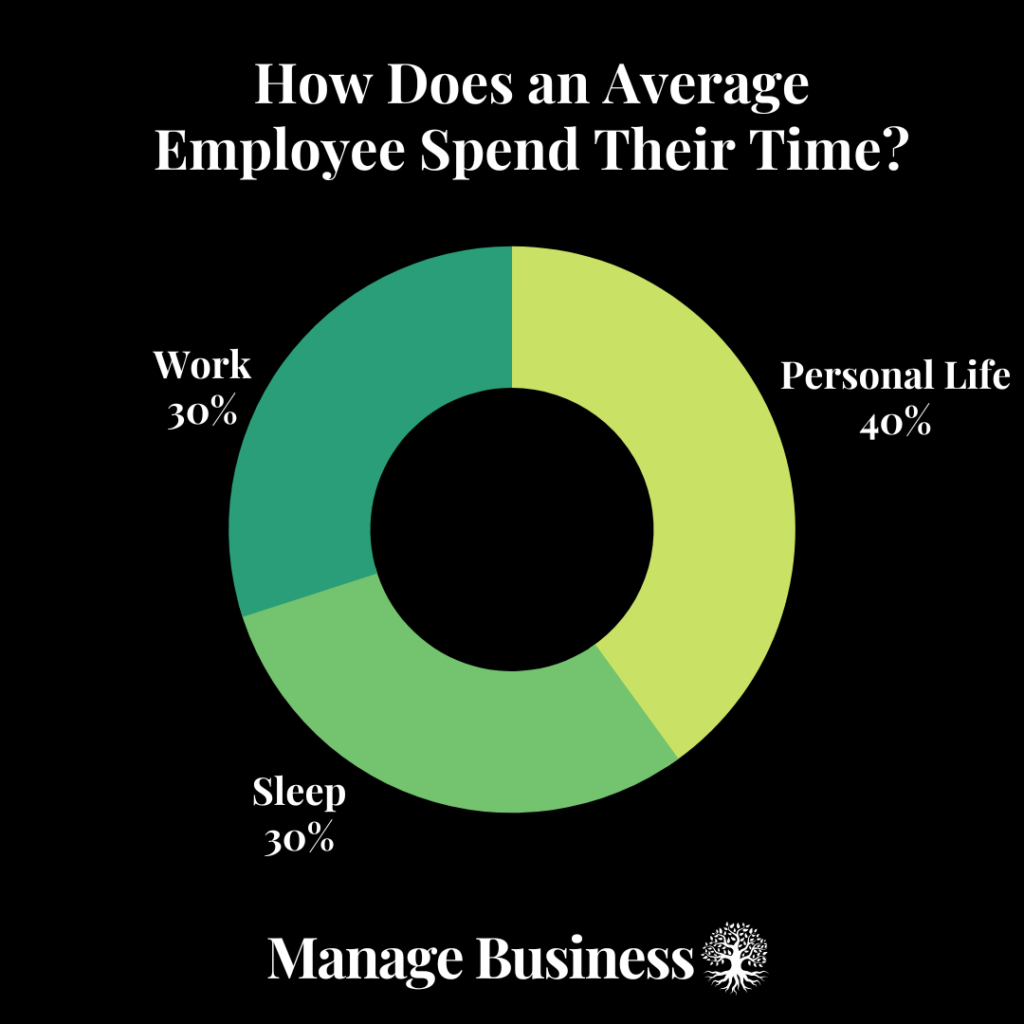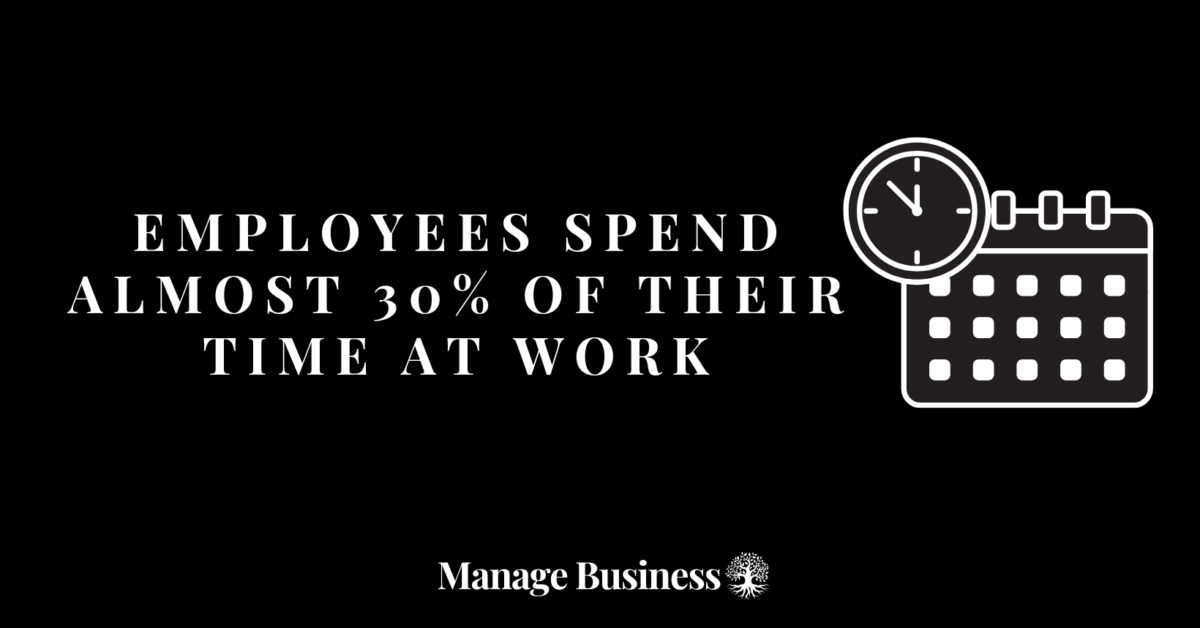Our content is reader-supported. We may earn a commission if you make a purchase through one of our links.
HR specialists at Manage Business recently conducted a study that found employees spend almost a third of their time at work. The study investigated what share of employees’ life is spent at work and what that means for them and their employers.
Part of the findings was that an average employee working a 40-hours-a-week job spends more than 30% of their time at work, commuting to the workplace, and getting ready for it. That’s more than a third of their time every week. Read on to find out what this means.
The Findings
If you work an eight hours a day, five days a week job, you spend 40 hours a week at work. That amounts to nearly 24% of your entire week.
Add to it the time you spend commuting to and from work. According to a 2019 survey, the average American worker spent almost an hour commuting to and from work daily. That’s five hours a week. Add five more for the time you spend getting ready for work and settling back at home after coming back. This takes your total to 50 hours a week spent at work or completing work-related chores, or 30% of your entire week.
Not to mention sleep. 7-8 hours of sleep every day is essential for employees to be productive. Sleep takes up a minimum of 30% of your week too. Leaving you with only 40% of your entire time to spend at home, with your family, or with yourself.

How Much of Their Entire Life Do Employees Spend At Work?
If you work all through adulthood until you reach full retirement age, you will have been employed in some capacity from the age of 20 to 65. This is equivalent to 45 years of paid work.
Premised on a reasonable approximation of 50 hours*(52-5 = 47 weeks to accommodate for holidays)*45 years, you will spend a maximum of 105,750 hours working during your life. This is when we use the median number of hours spent each week, which is 40 hours weekly as per US Labor Law.
Given the average expected mortality rate of 73.4 years as of 2019, as the World Health Organization reports, this would be 16% of your whole life.
An Average Employee Spends 16% of Their Life at Work
The period mentioned above actually spent on working can fluctuate depending on various factors. These may include your earnings and expenses, your parents’ benevolence, any inherited wealth you may receive, investment gains, and others.
However, for the vast majority, an essential variable that defines the working hours throughout your life is income. In other words, you will require less money overall and will not need to work as many hours if you spend less than you earn.
Work to Live or Live to Work?
Should you “work to live or live to work”? Many are unsure about what’s best for their long-term well-being and professional success. Since it largely depends on how you were raised or how you believe you should utilize your time, there is no simple answer to what’s optimal.
Working to Live
Simply put, people who work to support themselves are only employed for the goal of making money. Even if they have a job that makes them miserable, their main goal is to earn and support themselves and their family. When making a living is the primary motive to work, a worker’s interest in their work may gradually decline.
As a result of their lack of interest, employees’ overall productivity falls drastically over time. They look forward to going home after work and on the weekends. Even if they spend ample time away from work, earning to live is not usually considered fulfilling. This is because they’re fundamentally dissatisfied 40 hours a week plus the 10 they spend getting ready and traveling to and from the workplace.
Living to Work
Although working to thrive is the reverse of thriving to work, living to work is no way wiser. Individuals who live to work are often considered obsessed with their jobs.
Success in their careers and earning a living doing what they enjoy is the primary source of fulfillment in their lives. Consequently, these people frequently put their professional lives ahead of their personal life, which can lead to other troubles.
Even though it’s helpful to acknowledge whether you live to work or work to live, things do not have to continue the same way. You don’t have to pick between the two. It’s feasible to like your job and yet have ample time for yourself and your loved ones.
Importance of Work-Life Balance
A person with a healthy work-life balance allocates a suitable about of time for their personal life and their job, so they can feel fulfilled at both ends. Such a person will not let their jobs take over their lives, nor will they let their personal life distract them from their professional goals.
Here’s what an optimal work-life balance can do for you:
- You stay motivated and productive at work, without one, you’re likely to burn out
- It’s vital for your health and wellness. Working more than 40 hours a week can be exhausting, and juggling demanding professional responsibilities with family obligations can be even more tiring.
- You will have enough time for your family. You will also have leisure time to indulge in your passions, such as enjoyable pastimes like reading, sports, or art.
What’s the Optimal Amount of Time You Should Spend Working
Whatever your work preferences are, be aware that working longer hours does not always translate into greater productivity. According to a study by Stanford University’s John Pencavel, efficiency starts to decline substantially after 50 hours a week and goes downhill after 55. Moreover, a reduced overall hourly production results from not having a day off in a week.
Laura Vanderkam, a time management specialist, surveyed how daily work hours affect the free time you believe you have. The average worker of the 900 participants worked 8.3 hours a day.
The findings revealed that there was only a 1-hour gap between the employees who believed they had ample time in contrast to those who thought they were time-pressed. Those who believed they had less time altogether put in 8.6 labor hours a day. Those who thought they had sufficient free time worked for 7.6 hours.
This study suggests that employees and employers should go for a 7.6-hour workday. This way, workers don’t feel pressed for time. That would be 38 hours of work every week.
How Does Your Workspace Environment Affect You?
Your office’s layout counts. A cubicle is the ultimate obstacle to creativity and productivity.
As a result, businesses and entrepreneurs are increasingly shifting towards unconventional offices. Shared office environments provide teams with exceptional accommodations and services to foster innovation, like flexible work zones, private conference halls, and stimulating relaxation areas.
Individuals who work in plain offices with achromatic themes reported feeling depressed and melancholy. Similar research suggests that colors can influence employee productivity greatly.
- Low-wavelength hues like blue walls and green plants increase productivity and concentration
- Yellow, a medium-wavelength color, inspires creativity and happiness
- Red and other high-wavelength hues raise energy levels and heart rates
- Plants can boost workplace productivity by 15%
What Can Overworking Result In?
Simply adding up the hours worked can be misleading. The duration of your travel, other obligations, work atmosphere, sentiments of gratitude, and job satisfaction are additional elements that can contribute to burnout.
Amongst all the hassle, paying attention to your body is essential. Here’s how to find out if your body is exhibiting any distress signals due to your workload.
- Turning to Alcohol
Working over 40 hours a week will increase your propensity to consume alcohol in ‘risky’ quantities. A life-threatening disease may become more likely if you drink too much alcohol.
It is recommended to rest during your commute home. It is essential to re-energize, so breaks are vital. If you use computers all day at work, try to avoid devices on the way home. Instead, tune in to your preferred podcast, audiobook, or playlist.
- Daytime Fatigue
Simple math shows that staying up later results in less sleep, greater afternoon weariness, and lesser productivity. Less sleep makes you irritable and raises your risk for long-term illnesses like type 2 diabetes or heart problems.
Give yourself rest periods. Take 17-minute pauses throughout the day to stretch, go for a walk, or chat with a companion. You could be able to overcome daytime exhaustion with this.
- Neck and Back Problems
It is not always a smart option to repeat things. Your risk of developing back pain increases with the number of hours you work.
- Your Social Ties Can Suffer
Even if you find time for your loved ones, the pressure, exhaustion, and despair you feel because of work could also adversely affect your relationships with friends and family. Work might follow you outside the office, particularly if you’re self-employed.
Include extra activities like exercising, listening to music, or catching up with friends on your list to help you unwind. If you can, arrange these activities daily or ensure they are included in your weekly calendar.
Wrap Up
Knowing the number of hours in a work year can be helpful. Psychologically, this can improve the way you feel regarding your income.
It enables you to make financial calculations to determine whether something is worthwhile. Although break times, extra pay, and vacation days are all controlled, the number of hours worked is not.
This rule aims to enhance health and safety by eliminating excessive workloads and workplace abuse. It enables the worker to operate as efficiently and productively as possible.
About the author
Dr. Gabriel O'Neill, Esq., a distinguished legal scholar with a business law degree and a Doctor of Juridical Science, is a leading expert in business registration and diverse business departments. Renowned for his academic excellence and practical insights, Dr. O'Neill guides businesses through legal complexities, offering invaluable expertise in compliance, corporate governance, and registration processes.
As an accomplished author, his forthcoming book is anticipated to be a comprehensive guide for navigating the dynamic intersection of law and business, providing clarity and practical wisdom for entrepreneurs and legal professionals alike. With a commitment to legal excellence, Dr. Gabriel O'Neill, Esq., is a trusted authority dedicated to empowering businesses within the ever-evolving legal landscape.
